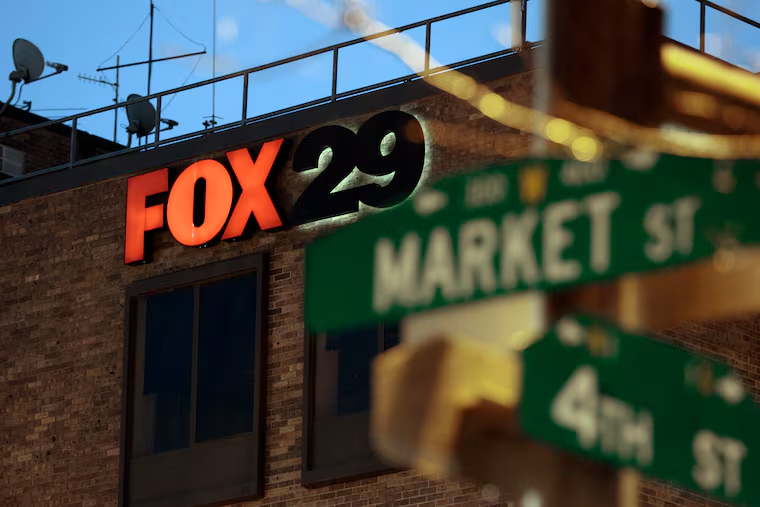Fox Corp. asks the FCC to dismiss a petition seeking to deny renewal of Fox 29′s broadcast license
Fox News Channel defended itself against a petition filed by the Media and Democracy project, a nonpartisan organization that focuses on media issues.

Fox Corp. has asked the Federal Communications Commission to dismiss a recently filed petition seeking to deny the renewal of Fox 29′s broadcast license, saying in a new filing that taking the Philadelphia-based station off the air would be “fundamentally incompatible with the First Amendment.”
Fox Corp.’s objection, filed Wednesday, is in response to a petition submitted in July by the Media and Democracy Project, a self-described nonpartisan organization that focuses on media issues. The group asked the FCC not to renew Fox 29′s broadcast license because Fox broadcast “knowingly false narratives about the 2020 election” on its cable station, Fox News Channel — “a good deal” of which was rebroadcast on Fox 29, the group wrote in its petition.
The broadcast license is set to expire this month.
At the heart of the filing was the Dominion Voting System’s defamation lawsuit against Fox, which the company settled earlier this year for $787.5 million. That settlement, MAD wrote, was “tantamount to a guilty conviction,” and put Fox Corp. in violation of the FCC’s policy on licensee character qualifications.
But in its objection this week, Fox Corp. said that, historically, the FCC has not used an “unrelated civil matter” to deny broadcast license renewals. And Fox Television Stations, the licensee that has owned and operated Fox 29 since 1995, was not named in the Dominion lawsuit.
In addition, the company said, MAD’s petition “fails to offer any credible support” for claims that Fox 29′s broadcasts were run irresponsibly. The petition points to the station’s airing of Fox News Sunday, which is produced by Fox News Channel, as evidence that the Philadelphia station serves as an “over-the-air extension” of the cable network.
Fox Corp., however, says that there is no evidence that Fox 29 aired any of the content cited in the Dominion case, and as a result, it could not have participated in alleged “news distortion” — a practice that is illegal, per FCC rules. In fact, Fox Corp.’s filing argues, Fox 29 aired multiple segments expressing viewpoints contrary to those that are the focus of the petition.”
“MAD offers no evidence that [Fox Television Stations] or Fox 29 Philadelphia aired the content of which they disapprove, nor does MAD contend with the obvious First Amendment problems of conducting the broad, content-based inquiry that it seeks,” Fox’s filing said.
Granting MAD’s petition request, Fox Corp. argued, would amount to a landmark regulation of broadcast content, which the FCC has historically stayed away from for First Amendment reasons.
Cable networks such as Fox News Channel aren’t regulated by the FCC, unlike broadcast stations such as Fox 29. But punishing the Philadelphia station “on the basis of cable network content” would be a violation of the First Amendment, as well as the FCC’s authority, the company’s filing said.
“It is sadly ironic that an organization purportedly focused on the role of media in a healthy democracy would seek to convert a government agency that has long respected the First Amendment into a roving censor of news and other content,” Fox Corp. wrote.
In response to Fox Corp.’s objection, MAD said in a statement that the First Amendment is not at issue in its filing, but rather one of “egregious misconduct that shocks the conscience following decisions by FOX’s most senior management to knowingly broadcast false news.” As a result, it said, the FCC must grant an evidentiary hearing looking into Fox’s conduct.
“Never before has the commission been confronted with so much evidence attached to our petition that clearly shows that an FCC broadcast licensee undermined the public trust,” the organization said. “The FCC must initiate a hearing on FOX’s qualification to be trustees of our nation’s airwaves.”
To date, however, the FCC has not taken public action on the petition. Last l, an FCC official who agreed to speak on the condition of anonymity because of not being authorized to discuss the filing said the commission was unlikely to pursue it because its reasoning falls outside of the FCC’s purview.